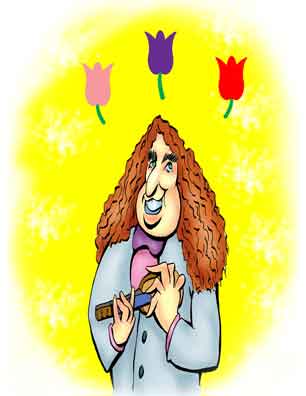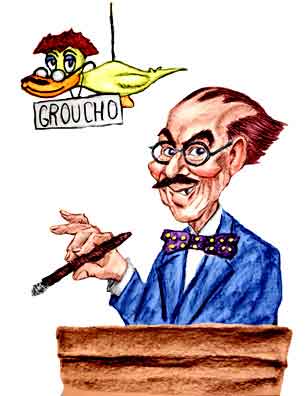Tiny Tim

Tiny Tim
(Herbert Khaury)
For those who are too young to have heard of Tiny Tim (whose real name was Herbert Khaury), tune to the first episode of SpongeBob SquarePants. When SpongeBob starts to cook the Krabby Patties, the accompanying song is Tiny Tim singing "Livin' in the Sunlight, Lovin' in the Moonlight".
The song is quite representative of Tiny Tim's repertoire. First, it's a popular song from (or inspired by) the first decades of the twentieth century. Next, it was sung in falsetto - rendered completely in tune but with a curious and rapidly quavering vibrato. Although it's his falsetto singing that most people remember, Tiny sang in a variety of registers including baritone and could switch back and forth in the same song.
That Tiny Tim would become a hit singer is almost as improbable as it would have been for him to become a popular local entertainer during the beatnik era in Greenwich Village.
Which is what he did. Starting in the 50's, the clubs in the Village might set aside some nights for singers, musicians, and poets to come in and perform. Many performers were much of muchness with little to distinguish one from the other. A few, though, were unique and club owners might have them come in as a featured performer. They could pass the hat or maybe even get a small payment from the club.
And Tiny was certainly sui generis. Seeing him standing on stage in a rumpled black suit with his long straggly hair and pale pasty complexion while singing in his quavering falsetto songs from an increasingly forgotten era, many people found him appealing and even lovable.
But it was really the underlying if unintentional humor of his performance that caught everyone's attention. Tiny was well aware of the reaction to his performances. "Before I was a big star people used to point on the street at me and laugh," he said. "Now I'm a big star, people point to me on the street ... and laugh."
But the World became aware of Tiny Tim when he appeared on the comedy-variety show Rowan and Martin's Laugh-In. Dan and Dick invited Tiny to be on the "New Talent" segment of the show, but it's not clear how they discovered him. You'll read on the Fount of All Knowledge it was Tiny's appearance in the film You Are What You Eat that led to the invitation. However, it's hard to understand how a film whose release date is listed as September 1968 was responsible for Tiny appearing on Laugh-In the previous January.
On Laugh-In Tiny performed his signature song, Tiptoe Through the Tulips. He sang in falsetto and from Dick's reactions - and that of the audience - it was clear that Tiny was there for the comedic effect.
After Laugh-In, Tiny was immediately signed to a recording contract with Reprise Records - the label founded by Frank Sinatra - and in February God Bless Tiny Tim hit the stores. The album - like the Beatles' Sergeant Peppers Lonely Hearts Club Band - was packaged as a single performance rather than simply as a collection of individual songs.
God Bless Tiny Tim quickly sold out and received good reviews. Admittedly not your ordinary record, it's actually fun to listen to. But be warned! It is a 1960's album at the most surreal.
Tiny soon began playing to sell-out crowds in Las Vegas and before the end of the year he performed at the Royal Albert Hall in London. His success in 1968 - dubbed The Incredible Year by Life Magazine - was a shock for a performer who had never made much more than $50 a week. His yearly income skyrocketed to over a million dollars - and that was when a million dollars was a lot of money.

Ed Sullivan
The #1 Slot
Naturally Tiny appeared on other television shows including what was the #1 entertainment slot, The Ed Sullivan Show. He became a regular guest on the Tonight Show with Johnny Carson where he always addressed Johnny as "Mr. Carson" (and became horribly flustered when Johnny asked him to call him by his first name).
And of course it was on the Tonight Show and before what was one of the largest TV audiences in history that Tiny married Victoria Budinger who was always known as Miss Vicki. The marriage lasted eight years and Tiny married two more times.

Johnny Carson
Tiny was a frequent guest.
By all accounts Tiny's extraordinarily polite personality - he would throw kisses to the audience - was his real one, not a creation for satirical effect. His worldview, though, was definitely unique and did not always result in tranquil living. A man of deep religious convictions, he tried hard to keep to the tenets of his faith when surrounded by eager groupies (whether his faith ever failed him is a matter of some question).
Like many superstars Tiny's life was not smooth sailing even when he was at the peak of his career. He did not have a great financial sense, which was coupled with an extreme generosity to ordinary people. He would give $100 tips long after his heyday.
With his appearance and unusual singing style - not to mention his preferred instrument being the ukelele - many people found his performances contrived and trite. On one of the Tonight Show episodes both Tiny and the pioneering broadcaster Lowell Thomas were guests. Lowell clearly didn't think much of Tiny, and he made some sarcastic and snooty remarks. Either Tiny didn't recognize the sarcasm or was just too polite to do anything but respond seriously.
The truth is Tiny was an expert on the popular music of the early 20th century and his singing helped bring about renewed interest in the era, an interest that had begun with the 1966 release of "Winchester Cathedral" by the New Vaudeville Band. The New Vaudeville Band was actually created after the record was released as the musicians were session players, and the song's composer, Geof Stephens, found himself with a #1 hit but no band. Trumpeter Herb Alpert was in a similar situation after he recorded The Lonely Bull and so emerged the Tijuana Brass.
Tiny's singing style was such a far cry from being a deliberate pastiche of the old singers like Rudee Valee and Al Jolson that a lot of Tiny's younger fans didn't realize he was singing some of the Oldest of the Golden Oldies. One viewer of a late night movie made in the 1930's was surprised to hear "Tiptoe Through the Tulips" as it was played in the background. In fact, "Tiptoe Through the Tulips" had become a hit in 1929 when it was sung by Nick Lucas in the film Golddiggers Through Broadway.
Nick was one of the first popular singers to accompany himself on the guitar (actually he was a virtuoso guitarist who later became a "crooner") and his popularity is largely credited with reviving the flagging Gibson Guitar company. Nick's recording of "Tiptoe" is rendered in a high tenor where to keep the sound soft he went into falsetto on some high notes. You can hear Nick's influence on Tiny and one of Tiny's happiest performances was when he was able to sing with Nick who lived until 1982. Tiny and Rudy Valée were also able to perform together.

Groucho Marx
The song was well-known.
It's hard to appreciate how the emergence of rock-and-roll - soon truncated simply to "rock" - buried pre-1950's popular music. "Tiptoe Through the Tulips" was still well-known into the 1950's. It was the answer for one of the questions on Groucho Marx's You Bet Your Life - which the contestant answered correctly. But some who heard Tiny Tim singing the song thought it was a recent composition.
It was inevitable, we suppose, but as the 60's faded so did the phenomenon that was Tiny Tim. A second album did not sell well, and in the mid-1970's a reporter found Tiny standing on a street in the rain, coat collar turned up, and almost the stereotypical picture of the starving artist. He was obviously ill but at least was on his way to see about a new gig.

Pat Paulsen
Another 60's Veteran
It is true that Tiny's superstardom faded with the Sixties and he went through some tough times of near destitution. But he kept performing in clubs and other live entertainment venues for the rest of his life. He relocated to the Midwest, first living in Des Moines and then in Minneapolis where another veteran of quintessential 60's television, Pat Paulsen, later worked as a radio announcer. Tiny kept up his regular appearances on the Tonight Show throughout the 1970's and on other television shows afterwards.
Tiny was plagued with a number of medical problems including diabetes and he later developed congestive heart failure. Although he did have a regular physician, he also had his own non-mainstream ideas of how to keep healthy. Then in 1996 he suffered a heart attack while on stage but recovered.
Later that year Tiny was scheduled to appear at a benefit for a women's club in Minneapolis. Although feeling unwell, he nevertheless felt he had to go on. During the performance he collapsed and soon lapsed into unconsciousness. He was taken to a hospital but died a few hours later. He was 64.
And yes, he had been singing "Tiptoe Through the Tulips".
References
Eternal Troubadour: The Improbable Life Of Tiny Tim, Justin Martell, Jawbone Press, 2016.
Tiny Tim: Tiptoe Through a Lifetime, Lowell Tarling, Generation Books, 2013.
"Tiny Tim Biography", Singer (1932-1996)", Biography.
"Tiny Tim", Frank Hoffmann (Editor), Encyclopedia of Recorded Sound, Routledge, 2004.
A Freewheelin' Time: A Memoir of Greenwich Village in the Sixties, Suze Rotolo, Broadway, 2008.
"Gibson", Acoustic Guitars, Tony Bacon and Dave Hunter (Editors), Outline Press, 2017.
Gold Diggers of Broadway, Nick Lucas.
"The New Vaudeville Band: Winchester Cathedral", The Robinson Library.
"For a short time, Tiny Tim Called Des Moines Home", Tom Longden, Des Moines Register, September 11, 2018
"Interview: Tiny Tim", Jerry Hopkins, Rolling Stone, July 6, 1969.
"You Are What You Eat:, Internet Movie Data Base, Release Date: September 24, 1968.
"It's High Time Fame Came to Tiny Time", Alfred Aronowitz, Life, June 14, 1968.
"God Help Us Every One", David Richards, The Washington Post, February 19, 1995.
"The Last Days of Tiny Tim", Roger Ebert, Balder and Dash, April 12, 2011.
"Tiny Tim is Signing Off: The Tragic Tale of an Artist's Final, Fatal Performance", Justin A. Martell, CuePoint, Justin A. Martell, November 30, 2016.
"Tiny Tim, Singer, Dies at 64; Flirted, Chastely, With Fame", The New York Times, William Grimes, December 2, 1996.
"Tiny Tim (1932-1996)", Internet Movie Data Base.